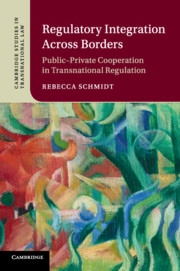
-
Select format
-
- Publisher:
- Cambridge University Press
- Publication date:
- 03 December 2018
- 06 December 2018
- ISBN:
- 9781108667692
- 9781108426787
- 9781108445535
- Dimensions:
- (228 x 152 mm)
- Weight & Pages:
- 0.5kg, 258 Pages
- Dimensions:
- (229 x 152 mm)
- Weight & Pages:
- 0.4kg, 258 Pages
- Subjects:
- Public International Law, Law, Comparative Law, Private Law
You may already have access via personal or institutional login- Subjects:
- Public International Law, Law, Comparative Law, Private Law
Book description
This book deals with a key feature of globalization: the rise of regulation beyond the state. It examines the emergence of transnational regulatory cooperation between public and private actors and pursues an inquiry that is at once legal, empirical and theoretical. It asks why a private actor and an international organization would regulate cooperatively and what this tells us about the material meaning of concepts such as 'expertise', 'authority' and 'legitimacy' in specific domains of global governance. Additionally, the book addresses the structures and patterns in which cooperation evolves and how this affects the broader global order. It does so through an investigation of two public-private cooperative agreements: one between the International Standards Organization, the Organisation for Economic Co-operation and Development, the Global Compact and the International Labor Organization and one between the International Olympic Committee and the United Nations Environment Programme.
Contents
Metrics
Altmetric attention score
Full text views
Full text views help Loading metrics...
Loading metrics...
* Views captured on Cambridge Core between #date#. This data will be updated every 24 hours.
Usage data cannot currently be displayed.
Accessibility standard: Unknown
Why this information is here
This section outlines the accessibility features of this content - including support for screen readers, full keyboard navigation and high-contrast display options. This may not be relevant for you.
Accessibility Information
Accessibility compliance for the PDF of this book is currently unknown and may be updated in the future.


